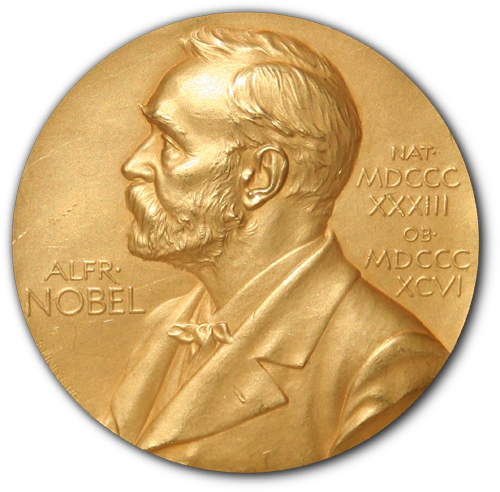So. It’s that time of year. It’s the 8th of October.
Yes! The Nobel Prizes for 2013 have been announced, giving us another group of people who we must both curse and admire for their amazingness. The first of the prizes was Physics. Last year the tentative discovery of a theorised fundamental particle of nature, which some of you may well know is the Higgs-Boson, was finally announced after its theoretical inception by Peter Higgs and other theorists in the 1960s. This was a powerful result, as its discovery marked the experimental observation of the final fundamental particle of nature as described by the standard model of physics. I remember my physics lecturer, the valorous Lloyd Hollenberg, noting the difficulty of choosing who should get the Nobel Prize, as it should have been called the Englert-Brout-Higgs-Giralnik-Hagen-Kibble Boson – but only three people can receive the Nobel Prize. However, Englert and Higgs seemed to have contributed enough to get them over the line for a Nobel Prize, so congratulations to them!
I feel that the Nobel Prize for Physics seems to be the most glorified of all, as I often hear less of the recipients of the other fields, so here they are if you are as uninformed as me!
The Nobel Prize for Chemistry was awarded to Martin Karplus, Michael Levitt and Arieh Warshel for their work in the computer simulation of complex chemical systems. Basically, their work comprised of creating computer models for systems of large compounds in which inaccurate but simple classical physics is used to model region with little reactivity occurring, whereas the more accurate but computationally more intensive quantum physics is used in calculations to model regions where more interactions between molecules take place.
“But Khaya, what about the Literature prize?”
Well, that was awarded to the Canadian short story writer Jane Munro. No, she’s not related to our Jane Munro. Referred to as the “Master of the Contemporary Short Story”, the name is really self-explanatory about her achievements. Upon searching, one of her works that peaked my interest and I hope to check out in future is her book Too Much Happiness, a text about a Russian female mathematician trying to find her place in the world.
The Prize for Physiology and Medicine was awarded to James Rothman, Randy Schekman and Thomas Sudhof for discovering the machinery of a transport system in cells. Unfortunately, I have to plead ignorance to what exactly that means.
Finally, Eugene Fama, Lars Peter Hansen and Robert Shiller were awarded the Prize for Economic Sciences for their work in the empirical analysis on asset prices. You’d have to ask one of our lovely commerce students for elaboration on what that may mean, as I once again defer the explanation due to ignorance.
So that’s the Nobel Prize. It’s good.



